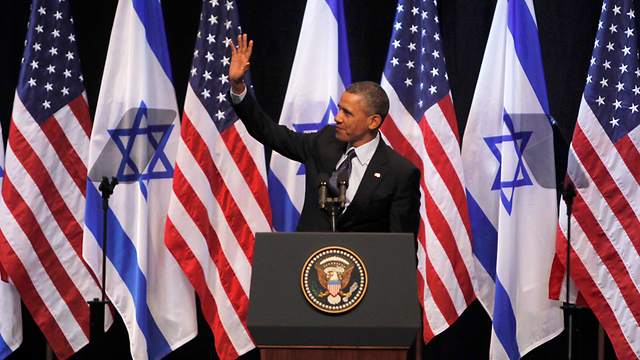Israel may be unable to reach a new defense aid agreement with the Obama administration and could wait for the next US president to secure better terms, a senior Israeli official said on Monday in a veiled rebuke signaling a snag in negotiations.

But a senior US official urged Israel to accept an increased 10-year multibillion-dollar package that President Barack Obama is offering, saying whoever occupies the White House next would be unlikely to demonstrate any greater commitment to Israel’s security.

US President Barack Obama address the crowd at the International Convention Center in Jerusalem in 2013 (Photo: Reuters)
Differences between the two sides, which surfaced after a round of negotiations on a new defense memorandum of understanding (MOU) last week, underscored continuing tensions over last year’s US-led nuclear deal with Iran, Israel’s regional arch-foe.
Israeli Prime Minister Benjamin Netanyahu was quoted by local media on Monday as telling his cabinet that if Israel’s security needs were not sufficiently met, he would hold off on signing an aid deal and wait for the next US president, who will take office next January.
Netanyahu, who has a history of testy relations with Obama, might be hoping for more sympathetic treatment from the next administration, whether Democratic or Republican. But his comments could also be a negotiating ploy to win concessions.
In an apparent swipe at the Obama administration, cabinet minister Ze'ev Elkin, a Netanyahu confidant in the ruling right-wing Likud party, said Israel was still waiting for a realistic offer from the United States.
Current US defense payouts to Israel, worth about $3 billion annually, expire in 2018. Officials say Netanyahu opened talks with a request for an increase to $5 billion annually, an amount the United States was unlikely to accept.
An Israeli official said on Monday that Netanyahu was hoping for about $4 billion, and would seek hundreds of millions of dollars separately for military projects such as missile defense. A US congressional source said, however, that MOU discussions had focused on a US offer of about $3.7 billion.
Waiting game
"When the accord with Iran passed, the US president pledged that he would do everything to provide a proper response for Israeli security," Elkin told Israel's Army Radio. Nevertheless, he said it was "possible" that Netanyahu would wait for the next White House occupant to clinch an MOU.
Israel, Elkin said, wants an MOU that "reflects a realistic assessment in terms of U.S. aid, in light of the big changes that US policy promises for the Middle East. After all, these things are not divorced one from the other."
He was referring to the international deal that curbed Iran's nuclear program in return for sanctions relief - which Israel had adamantly opposed - and the potential ensuing flow of funds to Tehran's militant allies, as well as US arms sales to Arab states looking to offset Tehran’s regional clout.
The Obama administration wants a new deal before the president leaves office as part of his legacy. Officials on both sides say agreement is unlikely before an expected Netanyahu visit to Washington in March but have not completely ruled it out.
Speaking before the latest talks, the third round so far, a US official told Reuters that any MOU should not be interpreted as “compensation” to Israel for the Iran deal.
The senior US official insisted on Monday that the administration was confident of reaching a new MOU that meets Israel’s needs and said that despite a “challenging budget environment” it would constitute "the largest single pledge of military assistance to any country in US history.”
“Israel is of course free to wait for the next administration to finalize a new MOU should it not be satisfied with such a pledge,” the official said. "But we would caution that the US budgetary environment is unlikely to improve in the next one to two years, and Israel will certainly not find a president more committed to Israel's security than is President Obama.”
















